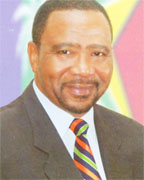President Bharrat Jagdeo yesterday said an initiative to improve cooperation between the political parties “unravelled” because of infighting within the main opposition party. But while he called for political leaders to work towards to greater collaboration, he suggested that the absence of trust between the parties casts doubt on PNCR leader Robert Corbin’s renewed interest in shared governance.

In his inauguration address nearly three years ago, Jagdeo advocated the need for political parties to work together under an enhanced framework of cooperation. However, at the half-way point of his last term in office, there hardly appears to be any real cooperation between the parties in or out of the parliament and the opposition have been constantly complaining about the lack of any meaningful cooperation. This was among the factors that led to the renewed call by Corbin for shared governance in order for national unity.
Jagdeo told a news conference yesterday that there was a follow up meeting on his proposal, but the campaign against Corbin’s leadership at the PNCR’s Biennial Congress derailed the process. He said, “…Everything unravelled because of a few people who were campaigning and said that the leader of the opposition was too close to the government and somehow that led to a distancing again.”
In the lead up to the PNCR’s last Congress, former party vice-chairman Vincent Alexander led a challenge against Corbin. Alexander subsequently aborted his campaign, citing concern over electoral irregularities at the Congress. He and his supporters were subsequently subjected to disciplinary proceedings, which were among the reasons that precipitated their decision to withdraw from the party. During this time, there has been a debate about Corbin’s leadership of the party and several calls for him to resign.
Jagdeo said that in the aftermath of the congress there was a different approach by the PNCR. Nonetheless, he indicated that he is genuinely interested in advancing the initiative since he believes that the parties can put their differences aside to work towards the national interest. He has urged that the initiative resume but anticipated that his intentions would be misrepresented. “Even now, many of the so-called critics of Mr. Corbin, they spread all kinds of lies: First of all, that we are working on a third term; absolutely untrue. Secondly, that the government pays him off not to be militant, which is a disparaging thing because that is not the way we work. And thirdly, that he needs to confront the government more.”
Stabroek News made several attempts yesterday to contact Corbin for comment but these were unsuccessful.
Jagdeo also echoed Corbin’s view that his critics simply want the party to take to the streets in order to “confront” the government. “But they want confrontation, because all the critics have to say is you must fight the government,” he said, “…not why don’t you find a way working together.”
He hoped that Corbin would not “fall pray” to that kind of logic, saying it has been responsible for perpetuating the divide in the country. “We need to find a way,” he said. “This must be rewarded…. Policies of collaboration must be encouraged by the parties and the leaders must be strong enough to say I am going to lead my party to genuine collaboration in spite of the so called dissidents and in spite of the critics out there.”
At the start of this year, Corbin said there is need for “a decisive shift” towards genuine national unity through shared governance, calling it the start of the journey towards self-development. “I am once again calling for a genuine inclusiveness that embraces all stakeholders in our society in the process of building this nation,” he said. “The prevailing exclusionary approach to governing Guyana will bring us nothing but disappointment and disaster.”
According to Jagdeo, however, trust is a prerequisite to greater collaboration between the parties. “If we can’t even convene a meeting to discuss a framework for enhance or improved collaboration, how can we jump to shared governance?” He referred to the PPP/C paper on inclusive governance and its emphasis on the need for a period of building trust between the parties. “Because it is only through a period of building of trust that you have lasting arrangements in the future,” he added, noting that time has borne out the position, as seen by the developments in Zimbabwe and Kenya where power sharing agreements have been unsuccessful. “What has happened, the movement is in a crisis now and once they try that and fail, the next stage is street,” he said.
In the paper, “Towards greater inclusive governance in Guyana – Building trust to achieve genuine political co-operation,” the PPP/C has said that no contrived system of governance will succeed in a situation where trust and good faith do not exist between the political parties. It said a conscious effort is required by the major political parties to build trust and establish confidence. “Without such trust, suspicion will continue, motives will be questioned, policies will be judged on distorted criteria, resource allocation will always be followed by allegations of partisanship and agreements will be difficult to be arrived at,” it noted. (Andre Haynes)




